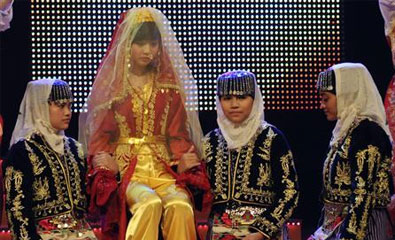Turkish Language Fest Shows Preacher's Global Reach
 "I want to see your hands," little Bangaina Jose from Mozambique shouts in confident Turkish to an auditorium of piously-dressed Turks clapping along to her song routine.
"I want to see your hands," little Bangaina Jose from Mozambique shouts in confident Turkish to an auditorium of piously-dressed Turks clapping along to her song routine.
The Turkish Language Olympics ― in its seventh year ― has drawn 700 children from 115 countries to Turkey to compete in singing, poetry reciting and prose composition, and receive encouragement in their studies with a visit to the president.
The competitors are the product of the schools of a powerful socio-religious community associated with the Turkish Muslim preacher Fethullah Gülen ― revered by many as a tolerant, moderating force in Islam, but suspected by some secularist Turks of harboring a political agenda.
Attitudes to the Gülen movement reflect the wider struggle for Turkey's identity: Gülen gleans much of his support from a rising group of religious-minded professionals who are the same people who helped sweep the Islamist-rooted AK Party to power in 2002 in a state founded with explicitly secular ideals.
Of the audience watching the singing competition in Istanbul, the vast majority of the women wear the Muslim headscarf and ankle-length coats.
Modern Faith
The reclusive Gülen, 68, who has met Pope John Paul II and other religious leaders, advocates a faith rooted in modern life, and his teachings have inspired millions of Turks to dedicate their time and money to groups active in publishing, charity and above all education.
These Gülen-inspired groups have built up a network of some 500 private schools around the world, from Poland to Nigeria, teaching a full curriculum including Turkish and urging pupils to aim high. They say they do not teach Turkish in order to spread Islam.
The Language Olympics are organized by the private International Turkish Education Association.
With their glitzy staging, they have the feel of a big television talent show or song contest, and teenage girls from Cambodia or Indonesia live up to the occasion, singing Anatolian love songs with the poignant yearning of a Turkish folk diva.
"I love Turkey and it's a language that lots of people speak," said 14-year-old Farzana Samiha, a singer sent to the Olympics by her school in Bangladesh.
"Turkish is not so hard, but it's harder than English," said Samiha, who hopes later to be a doctor.
The images of children from Africa or Central Asia dressed in traditional costumes and communicating with each other in Turkish have attracted a great deal of attention in Turkey, and not only among pious Muslims.
"It would be unfair not to write that I am totally impressed with the climate of brotherhood created by these children who have been educated in the community's schools," wrote columnist Ahmet Hakan in the secularist newspaper Hurriyet.
The Gülen schools, which often perform much better than local state schools and offer extensive scholarships.
Turkish language teacher Leyla Kayumova, originally from Uzbekistan, now works in Arizona and believes that, even thousands of miles from Turkey, learning Turkish has benefits.
"The world doesn't see Turkey as a Muslim or a religious country, they see it as a bridge country between East and West. If students were interested in Islam, surely they'd learn Arabic and not Turkish," she said.
Secular State
Though its people are predominantly Muslim, Turkey was founded as a fiercely secular state in 1923.
A military, judicial and academic elite who see themselves as custodians of this ideal have become increasingly uneasy with the social advance of a class of wealthy but pious Turks.
Such is the suspicion of Gülen in some quarters that he was charged over a decade ago with plotting to destroy the secular state and establish Islamic law.
He left for the United States in 1999 shortly before the case began, and has lived there ever since, despite being acquitted.
That acquittal was upheld on appeal last year, raising the question of whether he would return. However, Gülen is said to be poor health, which keeps him in America.
Some secularists still maintain he wants to train a cadre of people to run a future Islamic state, a charge his followers vigorously deny.
The first Gülen school opened in 1982 and as the number of his followers increased so did the schools.
"The sheer scale of the movement and the diversity of the countries in which it operates makes it impossible to substantiate the argument that Gülen is at the center controlling things," said Ozcan Keles, head of the Gülen-inspired Dialogue Society in London.
"If you have a secret agenda to overthrow the secular Turkish state, why open a school in Madagascar?" (Editing by Kevin Liffey)
- Created on .
